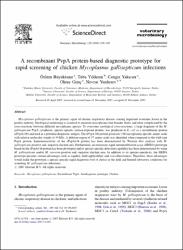A recombinant PvpA protein-based diagnostic prototype for rapid screening of chicken Mycoplasma gallisepticum infections

View/
xmlui.dri2xhtml.METS-1.0.item-rights
info:eu-repo/semantics/openAccessDate
2008Metadata
Show full item recordAbstract
Mycoplasma gallisepticum is the primary agent of chronic respiratory disease causing important economic losses in the poultry industry. Serological monitoring is essential to maintain mycoplasma-free breeder flocks and often complicated by the cross-reactions between different mycoplasma species. To overcome serological cross-reactions, a large fragment of the M. gallisepticum PvpA cytadhesin, species-specific surface-exposed protein, was produced in E. coli as a recombinant protein (rPvpA336) and used as a potential diagnostic antigen. The rPvpA336 protein possesses 336 mycoptasma-specific amino acids with relative molecular weight of 44 kDa. A deletion region of 37 amino acids was identified when compared to the wild-type PvpA protein. Immunoreactivity of the rPvpA336 protein has been demonstrated by Western blot analysis with M. gallisepticum-positive and -negative chicken sera. Furthermore, an enzymatic rapid immunofiltration assay (ERIFA) prototype based on the rPvpA336 protein has been developed and its species-specific detection capability has been demonstrated by using M. gallisepticum and/or M. synoviae-positive and -negative chicken sera. In addition to its species-specificity, the ERIFA prototype presents certain advantages such as rapidity, field-applicability and cost-effectiveness. Therefore, these advantages would make the prototype a species-specific rapid diagnostic tool of choice in the field and limited laboratory conditions for screening M. gallisepticum infections. (C) 2007 Elsevier B.V. All rights reserved.

















